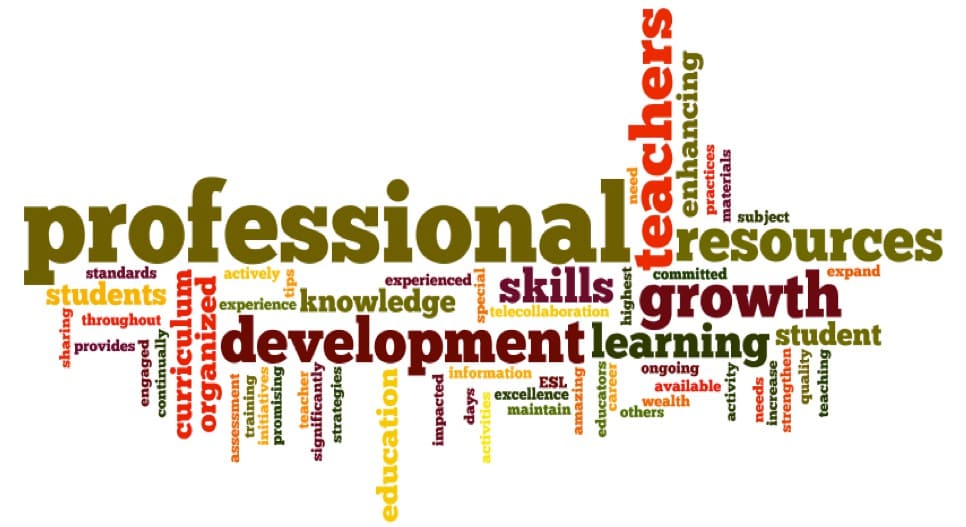When looking at successful people, this word always pops up in my mind: professionalism. How these people can maintain professionalism all the time? Which interpersonal skills are needed for developing professionalism?
Let’s take a look at the significance of developing professionalism, how you can develop professionally, and some good examples to help you get started.

Table of Contents:
- Why Developing Professionalism is Important?
- 8 Key Interpersonal Skills for Developing Professionalism
- How do You Professionally Develop Yourself?
- Frequently Asked Questions

Get your Employees Engaged
Start meaningful discussion, get useful feedback and educate your employees. Sign up to take free AhaSlides template
🚀 Grab Free Quiz☁️
Why Developing Professionalism is Important?
Professionalism does not mean wearing a suit or carrying a briefcase. Professionalism in the workplace is defined as "the conduct, aims, or qualities that characterize or mark a profession or a professional employee" in the workplace. Professionalism is showcased in how employees carry themselves, the attitudes and behaviors they convey, and the ways they communicate with their colleagues and clients.
Developing professionalism is significant for success in the business landscape. It includes learning and applying new knowledge and skills that can make a person successful in their field or go further in their career path.
Certain industries may not necessarily require their employees to undergo professional development but may demand it due to their fast-paced nature. For example, with the globalization of engineering projects, engineers often work on projects with international implications. Understanding global market trends, cultural nuances, and international standards is crucial, necessitating ongoing professional development.
Many individuals have been working in the same job or industry since they graduated from school, which can result in boredom, stress, disengagement, and unchanged salary. Thus developing professionalism can help individuals learn new approaches that can reignite their passion and excitement for work, making them look forward to coming to work each day. More importantly, it helps in getting a higher salary, getting a better job, and earning a promotion.
7 Key Interpersonal Skills for Developing Professionalism
Developing a professional image requires demonstrating appropriate interpersonal skills. If you want to bring your professionalism to a higher level, improving the following skills can be a great solution. They play a key role in helping individuals deliver a positive and competent image in the workplace.
Competence
Competence goes beyond having a basic understanding and implies a proficiency and capability to perform tasks effectively. It includes knowledge, values, experience, and the right skills for the jobs, which can lead to higher productivity, higher quality, and higher customer satisfaction, and ultimately contribute to market success and competitiveness.
Conscientiousness
It is often recognized as “the perfect personality for a team”. A conscientious employee or leader is mindful of how their actions affect others, respects deadlines, and is proactive in planning ahead. On the other hand, an individual who lacks conscientiousness is less organized and structured in their approach, which impresses people with unreliable and inconsistent.
Integrity
Integrity is the core of developing professionalism. Integrity is synonymous with trustworthiness. Professionals with high integrity are seen as reliable and honest, which fosters trust among colleagues, clients, and stakeholders.
Respect
A person shows professionalism through their respect for various aspects, such as: treating colleagues, clients, and stakeholders with courtesy and consideration; respecting diversity in the workplace; respecting other's ideas by listening actively, avoiding offensive language, and more.
Emotional Intelligence
Developing professionalism includes enhancing emotional intelligence, which includes navigating your own emotions effectively, and managing stress and reaction while understanding and empathizing with others at work.
Appropriateness
Being appropriate in your actions, communication, and behavior is crucial for professionalism. This includes understanding the context of different situations and adapting your conduct accordingly. It also involves making choices and decisions that are suitable, respectful, and considerate in various business situations.
Confidence
There is a strong relationship between confidence and professionalism. When developing professionalism it is also about developing confidence. Confidence contributes to making positive first impressions. Whether in job interviews, client meetings, or day-to-day interactions, a confident demeanor is often associated with professionalism, competence, reliability, and a strong professional presence.
How do You Professionally Develop Yourself?
Besides professional skills, it is also needed practice to strengthen and maintain professionalism. Let's explore 10 effective ways you can improve your professionalism at work.

Dress appropriately
If you don’t look like a professional, whatever you did later is meaningless. Thus, the first step to creating an image of professionalism is to dress appropriately. Dress to suit the career you want, not the one you have. An excellent first impression is crucial to appearing professional, even to strangers.
Read more and often
Reading regularly is one of the simplest methods to develop professionalism. Start reading and learning about developing professionalism in business now! When you read more often, you are exposed to a wealth of information, industry trends, and best practices. Staying informed about your industry and related fields enhances your knowledge base, making you a more valuable asset in the business world.
Practice your communication skills
Effective communication is a cornerstone of professionalism. It is crucial to practice communicating with others with clarity, and concisely, plus appropriate body language. Many successful people have excellent communication skills.
Learn about email etiquette
In business, it is common to use Email to send information to employees, employers, and clients. Thus, knowing how to maintain professional email etiquette can create a strong and positive impression. Avoid using nicknames or unprofessional handles in your email address.
Attend training and trade shows
Another effective way to develop professionalism in business is to attend training and trade shows regularly. Whether it's a workshop on leadership, communication, or technical skills, attending training events can contribute to your professional development. In addition, the trade show allows you to gain insights from experienced professionals and thought leaders and meet like-minded people, which helps to broaden your professional network.
Always grow your network
Expanding networks with professionals is a great method to develop professionalism. A robust professional network brings numerous benefits and contributes significantly to career growth and success. Interacting with professionals from diverse backgrounds allows for the exchange of knowledge and insights, or updating the latest industry trends, market dynamics, and emerging opportunities.
Keep your social media presence clean
Nowadays, social media presence is popular. People have the intention to search for profiles of their clients, and employees on social networks like LinkedIn, Facebook, and Twitter, to get to know their social circle and online behaviors before cooperating.
Be punctual
Punctuality is the key to professionalism. Respect for other's time is the basic professionalism skills that make a person earn a reputation for reliability and courtesy in the professional world. No one wants to work with a person who always misses the deadline, delays reports, or arrives the meetings late.
Remain calm under stress
To demonstrate professional behavior at work, you can learn to keep calm under stress and conflicts. Calmness allows individuals to think more clearly and rationally than be affected by emotions. This, in turn, facilitates effective problem-solving, as decisions can be made based on a careful and reasoned assessment of the situation.
Understand gift-giving etiquette
Last but not least, people also evaluate the professionalism of a person through how they give a gift in certain situations. Thus, gift-giving etiquette is a crucial aspect of demonstrating professionalism in the workplace. Whether it's a birthday, promotion, employee recognition day, or holiday celebration, choosing a gift is never an easy task. Knowing when and what to give is an art that can't be learned in one or two days.
Frequently Asked Questions
What does it mean to increase professionalism?
Job seekers must possess a comprehensive set of skills to meet the demands of employers. Professionalism, encompassing traits such as responsibility, ethics, teamwork, communication, interpersonal skills, and problem-solving abilities, is highly valued by employers.
What are the core competencies of professionalism?
The best demonstration of professionalism is integrity through work ethic, personal accountability, professional image, and ethical behavior.
Ref: Indeed | AIB.edu | Robinwaite








